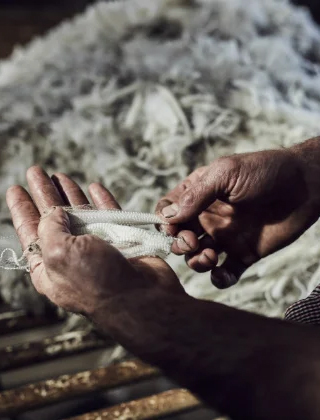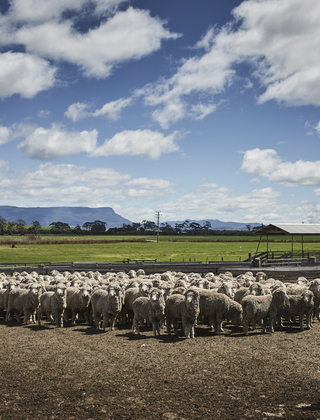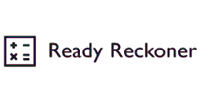Inspired Merino research
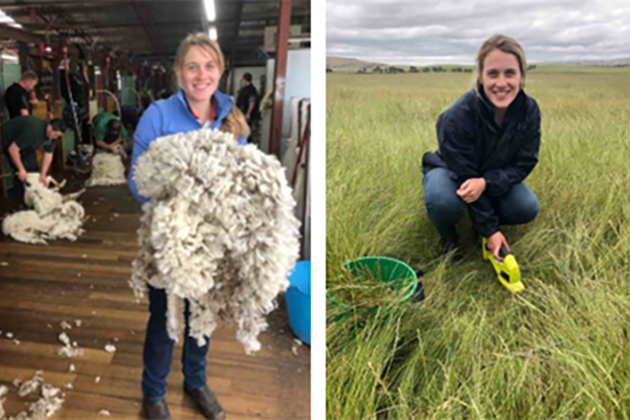
Taking part in AWI’s 2018 National Merino Challenge influenced Tasmanian Institute of Agriculture student Lauren Rowlands to choose an honours research topic on how to optimise the production of Merino wethers.
Taking part in AWI’s 2018 National Merino Challenge influenced Tasmanian Institute of Agriculture student Lauren Rowlands to choose an honours research topic on how to optimise the production of Merino wethers.
Lauren Rowlands grew up in a small rural town in the Southern Midlands of Tasmania and farming was an integral part of her childhood. Her grandparents have a family sheep farm and her father is a shearer and runs Merino and Merino cross sheep.
“I have always looked forward to lambing season and helping with lamb marking and shearing ever since I was big enough to catch a lamb,” she said.
However, it was attending a college careers fair and hearing about the diverse opportunities in farming that first put agriculture on her radar as a university and career pathway.
Lauren has gone on to study agricultural science at the University of Tasmania’s Tasmanian Institute of Agriculture (TIA). While there she has been exposed to a wide variety of topics, from livestock to cropping to grapevines.
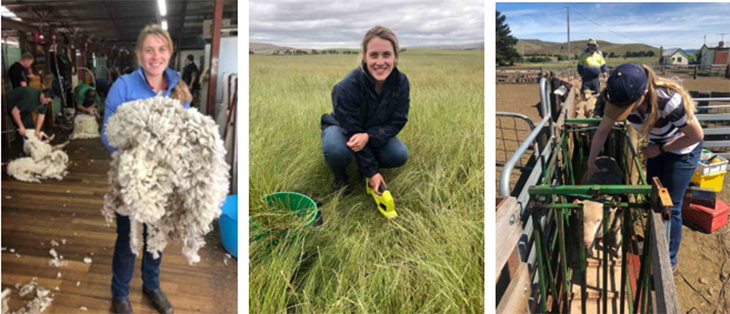
Tasmanian Institute of Agriculture student Lauren Rowlands has researched whether irrigated or dryland pasture is best to optimise Merino wether performance. She was inspired to choose this wool-related topic following her experience at AWI’s 2018 National Merino Challenge.
National Merino Challenge 2018
In May 2018, Lauren attended AWI’s National Merino Challenge event in Adelaide, along with more from 120 other tertiary and secondary students from across the country.
This two-day educational initiative connects students with industry professionals, highlighting an array of careers which involve working with wool. The students are educated and then assessed on their skills across a wide range of wool-related topics. Lauren was the overall champion of the tertiary division in 2018 and was also a member of the TIA team that won the tertiary team competition.
“The National Merino Challenge is a fantastic opportunity to become more aware of the practical skills that may be expected of an agriculture graduate entering the sheep industry – and the competition can help open your eyes to the countless opportunities the wool and sheep industry can offer the next generation,” Lauren said.
“I liked that it had skill components that covered the whole spectrum of wool production from on-farm decisions like feed budgeting, body condition scoring and ewe management, sale skills where we would have to select rams based on breeding objectives, and right through to typing wool.
“It was also a great opportunity to be around a new network of young people who were passionate and enthusiastic about the future of wool in Australia.”
Back on her course at TIA, Lauren decided to choose a wool-related topic for her honours research, a decision which she says was influenced by attending the National Merino Challenge.
“The competition made me more aware of the many management decisions and tools that are required to achieve a sheep farm’s goals and to really deliver a wonderful wool product. This made me want to do a project that I knew would directly help on-farm practices in the local area whilst still giving me the opportunity to learn more about wool as a product and how management decisions can influence its production.”
“The experience of the National Merino Challenge opened my eyes to the research and career opportunities in the Australian wool industry.”
Lauren Rowlands
Researching Merino wether performance
For her university honours research topic, Lauren chose to investigate which pasture diet is best for meat and wool production of Merino wethers: irrigated Lucerne and Clover or non-irrigated dryland pasture. The research was supported by a scholarship from the Australian Wool Education Trust and the trials were carried out at ‘Stockman Stud’ which is a large-scale commercial property running Merinos at Melton Mowbray.
“Traditional sheep management practices used in the Southern Midlands have the potential to be modified or replaced by irrigation systems, so this was very relevant and useful research for my local area,” Lauren said.
Two groups each of 50 sheep were incorporated into the commercial-sized flocks and allocated to a dryland or irrigation pasture rotation for five months from weaning to shearing (December 2018 – May 2019). Live weights, body condition scores, mid-side fleece samples and rectal faecal samples were collected at weaning and again at shearing when final fleece weight was also recorded.
“The trial identified the irrigated system as the system which was better able to deliver increased productivity, without compromising wool quality or animal health,” Lauren said.
“The irrigation system sheep had significantly heavier mean fleece weights at shearing and a greater change in body condition score in comparison to the dryland system sheep.
“There was no significant difference between systems for the fibre diameter of the wool at shearing and no significant difference in worm burden as measured by faecal egg counts.”
A gross margin analysis was also conducted by Lauren for each system.
“While the dryland system had a higher final gross margin compared to the irrigation system, the alternatives to stocking Merino weaner wethers bred on-farm to maximise the livestock potential of the irrigation system would have greater financial and biosecurity risk. With the changing Tasmanian climate, the irrigation system may be better suited to providing feed security into the future too.”
Lauren presented her findings at the Tasmanian edition of the Ag Institute’s National Student Awards in October and received an impressive second place out of all the Tasmanian entries.
Lauren graduated from university in December with plans to continue to learn as much as she can about sheep and animal production.
“I feel like there is still so much to learn and experience in the industry, so I am going to strive to continue learning and building up my skill set.”
For any other young people unsure about what direction they want to take, Lauren advises them to “have a go at everything”, whether it be work experience or initiatives like the National Merino Challenge.
“By experiencing different aspects of different industries, you can really help yourself work out what direction you want to head in. Even if you have no idea how you might feel about that industry, you may surprise yourself and, like me, really enjoy what you learn,” Lauren added.
This article appeared in the December 2019 edition of AWI’s Beyond the Bale magazine. Reproduction of the article is encouraged, however prior permission must be obtained from the Editor.






